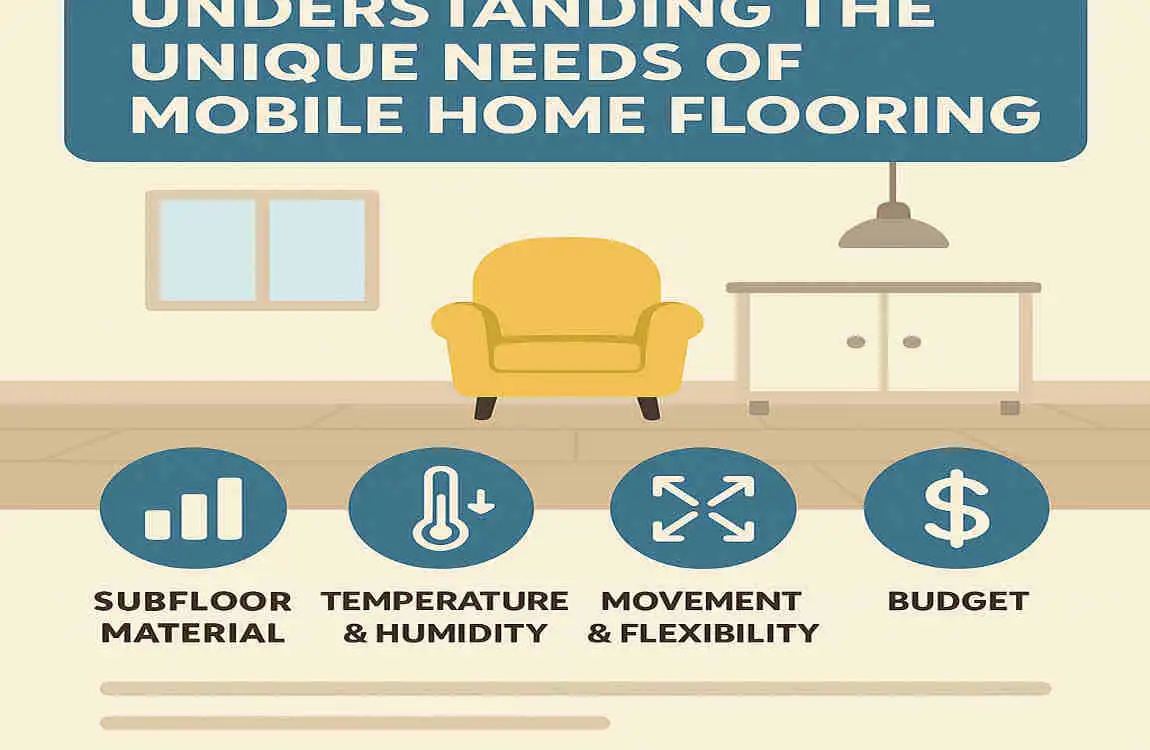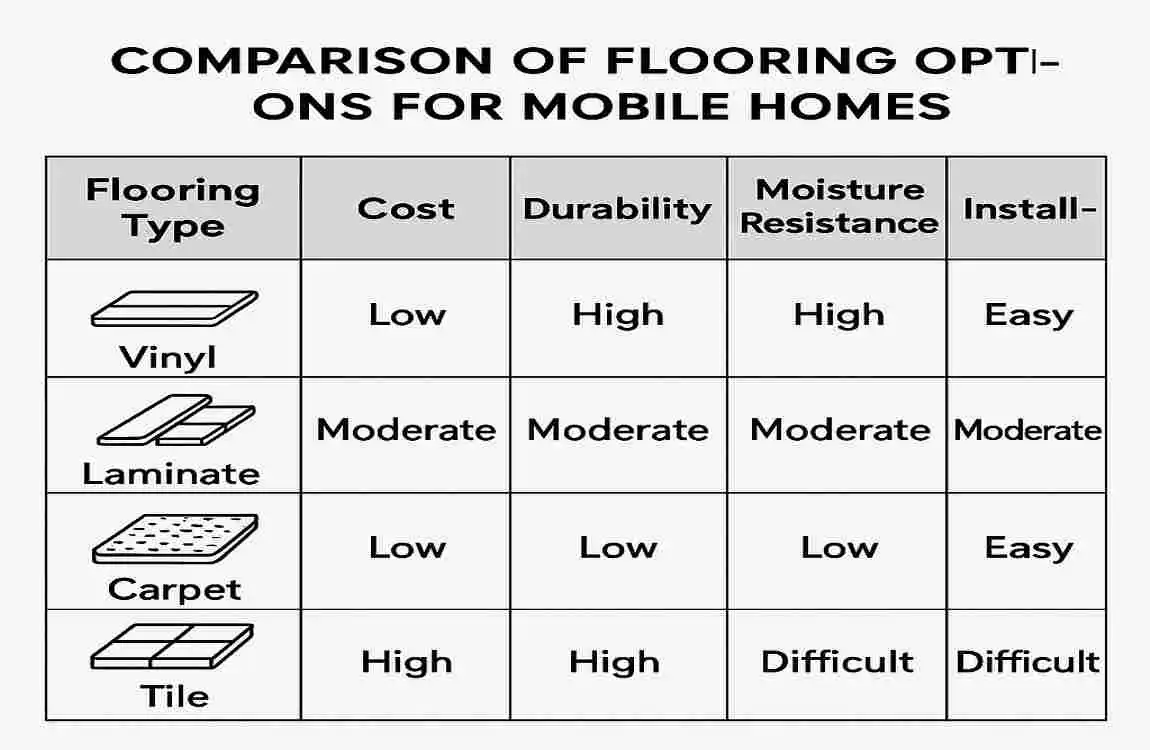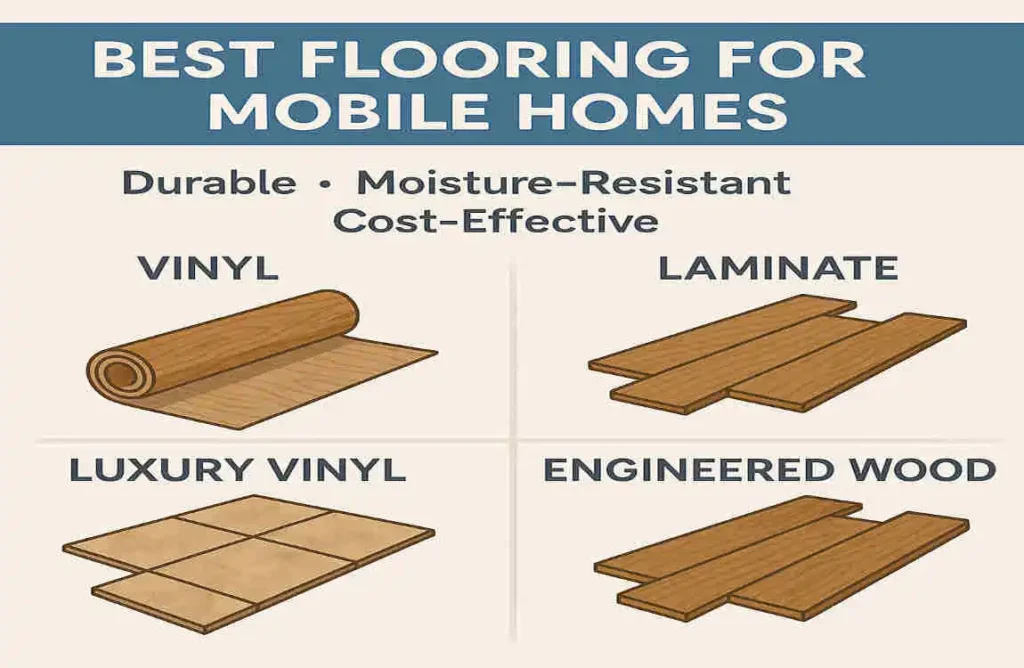Choosing the right flooring for a mobile home is a decision that combines practicality, durability, and aesthetics. Mobile homes face unique challenges compared to traditional homes, such as movement, moisture, and wear over time. These factors make selecting the ideal flooring material crucial to ensure long-term comfort and value.
Understanding the Unique Needs of Mobile Home Flooring

Mobile homes differ from traditional homes in several ways, which directly impact the flooring requirements. Let’s dive into the specific factors that make flooring selection for mobile homes unique.
Why Mobile Homes Require Special Flooring Considerations
Mobile homes are designed for mobility and affordability, which means they are often built with lightweight materials. This lightweight construction leads to the following challenges for flooring:
- Movement and Flexibility
- Mobile homes can shift slightly over time or when transported. This movement can result in stress on the flooring, leading to cracks, buckling, or other damage if the material isn’t flexible or durable enough.
- Humidity and Moisture
- Mobile homes are prone to higher humidity levels due to their construction and location, especially in humid or rainy climates. This makes moisture-resistant flooring essential to prevent warping, swelling, or mold growth.
- Wear and Tear
- With limited space, high foot traffic is concentrated in specific areas of mobile homes. Flooring must withstand heavy use without showing signs of wear too quickly.
Why Traditional Flooring May Not Be Ideal
While traditional flooring materials like solid hardwood or carpet are popular in stationary homes, they often fall short in mobile homes due to their susceptibility to moisture, movement, and higher maintenance requirements. For mobile homes, prioritize moisture resistance, durability, and cost-effectiveness.
Key Considerations When Choosing Flooring for Mobile Homes
Selecting the best flooring for a mobile home requires balancing several factors. Let’s look at the most critical considerations:
Durability
Durability is crucial for mobile homes due to the potential for movement and heavy foot traffic. Flooring must resist wear, cracks, and scratches over time. Durable materials ensure your flooring can withstand everyday wear and tear without constant repairs or replacements.
Moisture Resistance
Moisture is a significant concern in mobile homes. Spills, leaks, and high humidity can damage flooring materials that aren’t designed to handle water exposure. Opting for waterproof or water-resistant options is essential to prevent swelling, warping, or mold growth.
Cost-Effectiveness
While affordability is a priority for many homeowners, it’s essential to evaluate both initial costs and long-term value. Lower upfront costs may result in more frequent repairs or replacements, while a slightly higher investment can save money in the long run.
Comfort and Aesthetics
Mobile homes should feel cozy and inviting. Flooring materials should provide comfort underfoot while complementing the home’s interior design. Striking the right balance between function and aesthetics ensures your house feels warm and welcoming.
Overview of Popular Flooring Types Suitable for Mobile Homes
With the unique demands of mobile homes in mind, let’s examine the most popular flooring options. Each material offers distinct advantages and is suited to specific needs and areas of your home.
Vinyl Plank Flooring
Vinyl plank flooring is a top choice for mobile homes due to its affordability, durability, and waterproof properties.
- Key Benefits:
- 100% waterproof, making it ideal for kitchens and bathrooms.
- Highly durable and resistant to scratches and dents.
- Available in a wide range of styles, including wood and stone looks.
- Easy to install, even as a DIY project.
- Best Areas for Use:
- Vinyl plank flooring is versatile and can be used throughout the home, especially in moisture-prone areas like kitchens and bathrooms.
Laminate Flooring
Laminate flooring is another budget-friendly option that offers durability and style. While it’s not entirely waterproof, it can handle minor spills when cleaned promptly.
- Key Benefits:
- Scratch and stain-resistant, ideal for high-traffic areas.
- Affordable with a variety of designs, from wood to tile looks.
- Comfortable underfoot with optional padding.
- Best Areas for Use:
- Laminate works well in living rooms, bedrooms, and other areas with low to moderate moisture exposure.
Tile Flooring
Tile flooring is known for its durability and water resistance, making it an excellent choice for mobile homes in humid climates.
- Key Benefits:
- Completely waterproof, perfect for bathrooms and kitchens.
- Extremely durable, resisting wear and scratches.
- Available in endless styles, colors, and patterns.
- Best Areas for Use:
- Tile is ideal for bathrooms, kitchens, and entryways where water exposure is everyday.
Engineered Hardwood Flooring
Engineered hardwood offers the aesthetic appeal of traditional hardwood while providing greater moisture resistance and reduced warping.
- Key Benefits:
- Adds warmth and elegance to living spaces.
- Resists warping better than solid hardwood.
- Available in various finishes and wood species.
- Best Areas for Use:
- Best suited for living rooms and bedrooms where moisture is less of a concern.
Epoxy Flooring
Epoxy flooring is a durable, waterproof option often used in utility areas and high-traffic spaces.
- Key Benefits:
- Extremely durable and resistant to moisture, stains, and scratches.
- Creates a seamless and easy-to-clean surface.
- Customizable with various colors and finishes.
- Best Areas for Use:
- Ideal for utility rooms, garages, or high-traffic areas in mobile homes.
Comparison Table of Flooring Options for Mobile Homes

To help you make the best decision, here’s a side-by-side comparison of the most popular flooring options:
Flooring Type Durability Moisture Resistance Cost Ideal Usage Areas Maintenance
Vinyl Plank High 100% Waterproof Low to Mid All areas, especially bathrooms/kitchens Easy
Laminate Medium-High Water-Resistant Low Living rooms, bedrooms Moderate
Tile Very High Waterproof Mid to High Bathrooms, kitchens, Low
Engineered Hardwood Medium Moderate Mid to High Living areas, bedrooms Moderate
Epoxy Very High Fully Waterproof Mid to High High-traffic, utility areas Low
Installation Tips and Maintenance Recommendations
Installation Tips
- DIY vs. Professional Installation:
- While vinyl and laminate flooring are DIY-friendly, materials like tile and epoxy often require professional installation for a flawless finish.
- Prepare the Subfloor:
- Ensure the subfloor in your mobile home is clean, level, and dry before installation to avoid issues like uneven surfaces or trapped moisture.
Maintenance Recommendations
- Regular Cleaning:
- Sweep and mop your floors regularly to prevent dirt buildup.
- Moisture Control:
- Use dehumidifiers or proper ventilation to maintain a stable indoor environment.
- Protective Measures:
- Add rugs or mats in high-traffic areas and use furniture pads to prevent scratches.
Cost-Effectiveness: Balancing Budget with Quality
When budgeting for flooring, consider the initial cost alongside the material’s lifespan and maintenance needs. While some materials, like vinyl plank, have lower upfront costs, others, like tile or epoxy, may require a higher initial investment but last much longer.
For example:
- Budget-Friendly Choice: Laminate flooring offers style and durability without breaking the bank.
- Long-Term Value: Vinyl plank and tile flooring provide excellent durability and moisture resistance, making them worth the higher cost over time.
Additional Factors to Consider
Eco-Friendliness and Sustainability
Many homeowners are prioritizing environmentally friendly materials. Look for certifications like FSC (Forest Stewardship Council) for wood-based flooring or recycled materials in vinyl and laminate options.
Allergy and Health Considerations
Hypoallergenic flooring options, such as tile or vinyl, are ideal for homes with allergy sufferers, as they don’t trap dust or allergens.
Noise Reduction
Underlayment or padding can reduce noise and create a quieter, more comfortable environment.
